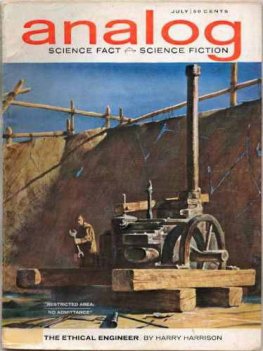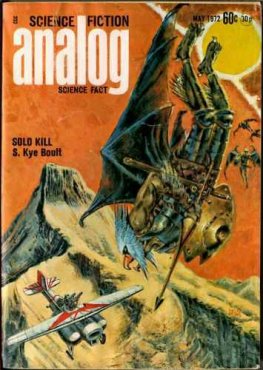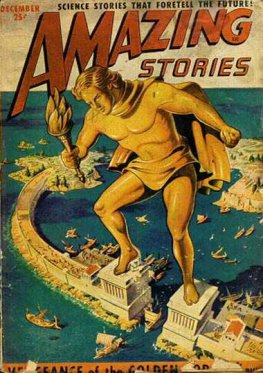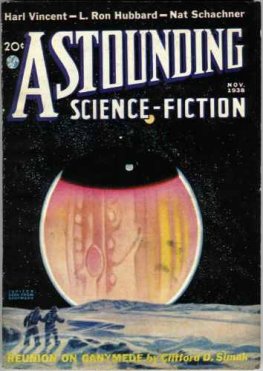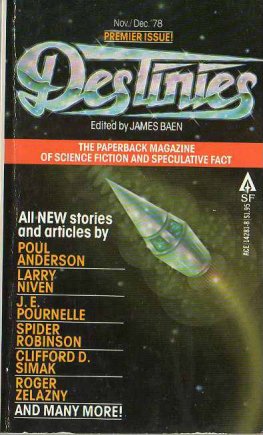Clifford Simak - New Folks' Home
Here you can read online Clifford Simak - New Folks' Home full text of the book (entire story) in english for free. Download pdf and epub, get meaning, cover and reviews about this ebook. year: 1963, publisher: Condé Nast Publications, Inc., genre: Science fiction. Description of the work, (preface) as well as reviews are available. Best literature library LitArk.com created for fans of good reading and offers a wide selection of genres:
Romance novel
Science fiction
Adventure
Detective
Science
History
Home and family
Prose
Art
Politics
Computer
Non-fiction
Religion
Business
Children
Humor
Choose a favorite category and find really read worthwhile books. Enjoy immersion in the world of imagination, feel the emotions of the characters or learn something new for yourself, make an fascinating discovery.
- Book:New Folks' Home
- Author:
- Publisher:Condé Nast Publications, Inc.
- Genre:
- Year:1963
- Rating:5 / 5
- Favourites:Add to favourites
- Your mark:
- 100
- 1
- 2
- 3
- 4
- 5
New Folks' Home: summary, description and annotation
We offer to read an annotation, description, summary or preface (depends on what the author of the book "New Folks' Home" wrote himself). If you haven't found the necessary information about the book — write in the comments, we will try to find it.
New Folks' Home — read online for free the complete book (whole text) full work
Below is the text of the book, divided by pages. System saving the place of the last page read, allows you to conveniently read the book "New Folks' Home" online for free, without having to search again every time where you left off. Put a bookmark, and you can go to the page where you finished reading at any time.
Font size:
Interval:
Bookmark:
Clifford D. Simak
New Folks' Home
(Analog 1963.05)
The house was an absurdity. What is more, it was out of place. And it had no right to be there, Frederick Gray told himself. For this was his country, his and old Ben Lovell's. They had discovered it almost forty years before and had come here ever since and in all that time there had been no one else.
He knelt in the canoe and stroked idly with the paddle to keep the craft in place, with the bright, brown autumn water flowing past, bearing on its surface little curls of foam from the waterfall a half a mile ahead. He had heard the faint thunder of the falls when he had parked the car and lowered the canoe from its top and for the past hour he'd traveled toward it, listening to it and storing the sound of it away, as he was storing everything away, for this, he knew, was the last trip to this place he would ever make.
They could have waited, he told himself, with a strange mellow bitterness. They could have waited until he had made the trip. For it was all spoiled now. No longer could he ever think upon this stream without the house intruding. Not as he had known the stream for almost forty years, but now always with the house.
No one had ever lived here. No one would want to live here. No one ever came here. It had been his and Ben's alone.
But the house stood there, upon the little knoll above the flowing stream, framed in all its shiny whiteness against the greenness of the pines, and with a path leading from his old camping place up to where it sat.
He wielded the paddle savagely and drove the canoe to the shore. It grounded on the gravel and he stepped out and hauled it up the beach, where it would be safe from the tugging current.
Then he straightened and stared up at the house.
How would he tell Ben, he wondered. Or should he try to tell him? Might it not be better, when he talked with Ben, to disregard the house? You could not tell a man, lying in a hospital from which he had small chance of ever going home, that someone had robbed him of a segment of his past. For when a man is near the end, thought Gray, his past is somehow precious. And that, Gray admitted to himself, was the reason he himself resented the house upon the knoll.
Although, perhaps, he thought, he would not have resented it so much if it had not been so ridiculous. For it was not the kind of house for a place like this. If it had been a rustic structure, built of natural wood, with a great rock chimney, all built low against the ground, it would not have been so bad. For then it would have fitted, or would have tried to fit.
But this stark white structure, gleaming with the newness of its paint, was unforgivable. It was the sort of place that some junior executive might have built in some fashionable development, where all the other houses, sitting on the barren acres, would be of the same sleek architecture. There it would be quite all right and acceptable, but in this place of rock and pine it was an absurdity and an insult.
He bent stiffly and tugged the canoe farther up the beach. He lifted out his cased rod and laid it on the ground. He found the creel and strapped it on, and slung the pair of waders across his shoulders.
Then, picking up the rod, he made his way slowly up the path. For it was only dignified and proper that he make his presence known to these people on the knoll. It would not be right to go stalking past them, up the river, without an explanation. But he would be very sure not to say anything that might imply he was asking their permission. Rather it might be quite fitting, he told himself, to make very clear to them the prior right that he held and to inform them stiffly that this would be the last time he was coming and that he would bother them no further.
The way was steep. It had seemed of late, he thought, that all little slopes were steep. His breath was shorter now and his breathing shallow and his knees were stiff and his muscles ached from kneeling and paddling the canoe.
Maybe it had been foolish to try the trip alone. With Ben it would have been all right, for there would have been the two of them, the one to help the other. He had told no one that he planned the trip, for if he had they would have attempted to dissuade him or what might have been far worse, offered to go along with him. They would have pointed out that no man of almost seventy should try such a trip alone. Although, actually, it was not much of a trip, at all. Just a few hours drive up from the city to the little town of Pineview and then four miles down the old logging road until he reached the river. And from there an hour of paddling up the river to the falls and the olden camping place just downstream from the falls.
Halfway up the slope he stopped to catch his breath and rest. From there he could see the falls, the white rush of the water and the little cloud of mist that, when the sun was right, held captive rainbows in it.
He stood looking at it all the darkness of the pines, the barren face of rocky gorge, the flaming crimson and the goldenness of the hardwood trees, now turned into autumn bonfires by the touch of early frost.
How many times, he wondered how many times had Ben and he fished above the falls? How many camp-fires had they lighted? How many times had they traveled up and down the river?
It had been a good life, a good way to spend their time together, two stody professors from a stodgy down-state college. But all things approach an end; nothing lasts forever. For Ben it had already ended. And after this one trip, it would be the end for him.
He stood and wondered once again, with a twinge of doubt, if he had made the right decision. The people at Wood's Rest seemed kind and competent and had shown him that he would be with the kind of people he could understand retired teachers and ancient bankers and others from the genteel walks of life. But despite all this, the doubt kept creeping in.
It would have been so different, he thought, if only Clyde had lived. They had been closer than most sons and fathers. But now he had no one. Martha had been gone for many years and now Clyde was gone as well and there were no others.
On the face of it, from every practical consideration, Wood's Rest was the answer. He would be taken care of and he could live the kind of life, or at least an approximation of the kind of life, to which he was accustomed. It was all right now to keep on alone, but the time was coming when he would need someone. And Wood's Rest, while perhaps not the perfect answer, was at least an answer. A man must look ahead, he told himself, and that was why he had made the arrangements with Wood's Rest.
He was breathing easier now and he went on up the path until he reached the little patch of level ground that lay before the house.
The house was new, he saw, newer than he had thought at first. From where he stood he imagined that he could smell the newness of the paint.
And how, he wondered, had the materials which had been used to build it been gotten to the site? There was no sign of any road. It might, he thought, have been trucked down the ancient logging road and brought up the river from where he had left his car. But if that had been the case, the logging road would have shown the signs of recent travel, and it hadn't. It still was no more than a rutted track, its center overgrown with grass, that snaked its way through a tunnel of encroaching second growth. And if it had been brought by boat, there should have been a skidway or a road leading from the river to the site, and there was nothing but the faint, scarcely worn path up which he'd made his way. There would not have been time, he knew, for the wilderness and weather to have wiped out the traces, for he and Ben had been here fishing in the spring and at that time there had been no house.
Font size:
Interval:
Bookmark:
Similar books «New Folks' Home»
Look at similar books to New Folks' Home. We have selected literature similar in name and meaning in the hope of providing readers with more options to find new, interesting, not yet read works.
Discussion, reviews of the book New Folks' Home and just readers' own opinions. Leave your comments, write what you think about the work, its meaning or the main characters. Specify what exactly you liked and what you didn't like, and why you think so.

